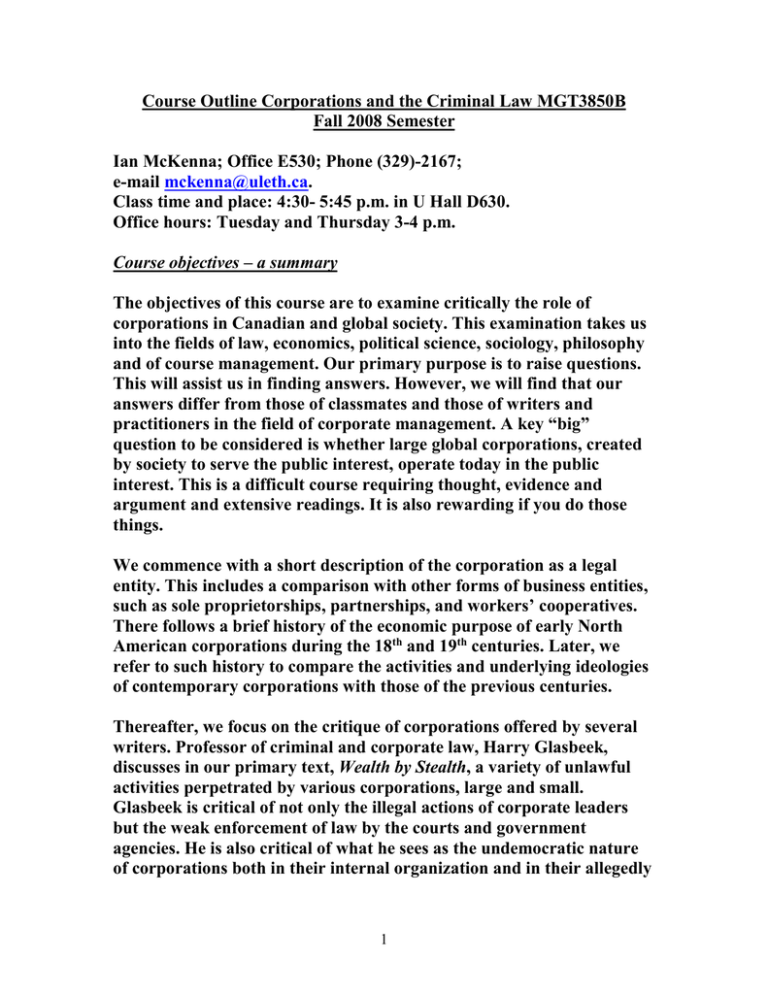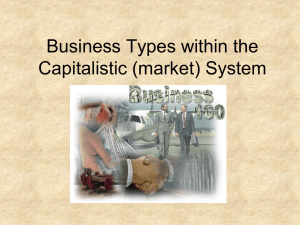
Course Outline Corporations and the Criminal Law MGT3850B
Fall 2008 Semester
Ian McKenna; Office E530; Phone (329)-2167;
e-mail mckenna@uleth.ca.
Class time and place: 4:30- 5:45 p.m. in U Hall D630.
Office hours: Tuesday and Thursday 3-4 p.m.
Course objectives – a summary
The objectives of this course are to examine critically the role of
corporations in Canadian and global society. This examination takes us
into the fields of law, economics, political science, sociology, philosophy
and of course management. Our primary purpose is to raise questions.
This will assist us in finding answers. However, we will find that our
answers differ from those of classmates and those of writers and
practitioners in the field of corporate management. A key “big”
question to be considered is whether large global corporations, created
by society to serve the public interest, operate today in the public
interest. This is a difficult course requiring thought, evidence and
argument and extensive readings. It is also rewarding if you do those
things.
We commence with a short description of the corporation as a legal
entity. This includes a comparison with other forms of business entities,
such as sole proprietorships, partnerships, and workers’ cooperatives.
There follows a brief history of the economic purpose of early North
American corporations during the 18th and 19th centuries. Later, we
refer to such history to compare the activities and underlying ideologies
of contemporary corporations with those of the previous centuries.
Thereafter, we focus on the critique of corporations offered by several
writers. Professor of criminal and corporate law, Harry Glasbeek,
discusses in our primary text, Wealth by Stealth, a variety of unlawful
activities perpetrated by various corporations, large and small.
Glasbeek is critical of not only the illegal actions of corporate leaders
but the weak enforcement of law by the courts and government
agencies. He is also critical of what he sees as the undemocratic nature
of corporations both in their internal organization and in their allegedly
1
excessive influence on government policy in Canada and across the
globe.
This raises the questions of whether corporations diminish democracy
and, if so, whether that is significant. If it is significant, we must address
the questions of how democratic principles can be strengthened by
rendering corporations more accountable to society for their actions.
Glasbeek offers suggestions in this regard as do Grossman and Adams
in their article Exercising Power Over Corporations Through State
Charters. In Canada Bill C45 was passed amending the Criminal Code
of Canada to render employers criminally liable for harm caused to
employees. We shall consider various questions raised by the authors’
suggestions, and by the short run impact of Bill C45 on the criminal law
in Canada.
Readings (Others will be referred to during the semester).
Harry Glasbeek, Wealth by Stealth, (2003, Between the Lines,
Toronto). YOU SHOULD PURCHASE THIS BOOK –
AVAILABLE FROM THE BOOKSTORE).
* Yates, Bereznicki-Korol & Clarke, Business Law in Canada,
(2005, 7th edition, Pearson Prentice Hall, Toronto). READ
CHAPTERS 13 & 14. AVAILABLE ON LIBRARY RESERVE.
McInnes, Kerr, et al., Managing the Law; The Legal Aspects of
Doing Business, (2003, First Edition, Prentice Hall, Toronto).
READ CHAPTERS 18 & 19. AVAILABLE ON LIBRARY
RESERVE.
Duplessis et al. Canadian Business and the Law (2001, Nelson, 1st
edition), chapters 14, 15, and 16). This is an alternative to the
Kerr and the Yates texts and is on LIBRARY RESERVE.
Richard L. Grossman & Frank T. Adams, Exercising Power Over
Corporations Through State Charters, in “The Case against the
Global Economy”, Jerry Mander & Edward Goldsmith (1996,
Sierra Club Books, San Francisco), pp. 374-392.
2
Carter Goodrich, Introduction; The Spirit of Improvement in
“Government Promotion of American Canals and Railroads 18001890”, pp. 1-16.
Achbar, Abbott & Bakan, The Corporation (Mongrel) - DVD
www.thecorporation.com
McCahery, Moerland, Raaijmakers, & Renneboog, Corporate
Government Regimes: Convergence and Diversity (2002, Oxford
University Press).
Cheryl A. Edwards & Ryan J. Conlin, Corporate and
Organizational Liability for OH&S under Bill C-45. (Thomson
Carswell 2005). COPIES ON LIBRARY RESERVE.
See also further suggested readings on class web page.
Outline of topics to be considered
1. Legal characteristics of corporations; comparison with other
forms of business organizations.
2. “Psychological characteristics” of corporations.
3. Historic purposes, functions, and ideologies of corporations.
4. The ideologies of competition, democracy and the public interest.
5. The role and activities of courts, legislators, and legal watchdogs
in establishing, controlling, and altering the powers of
corporations.
6. Examples of corporate infringement of law.
7. Arguments for and against greater legal intervention in the
activities of corporations.
3
8. The nature, purpose and effect of the Canada Criminal Code as
amended by Bill C45. The role of Bill C-46.
9. Constitutional rights of corporations. Drug advertising.
10.Other topics may be considered as raised by students in the class.
Assessment of Grade (% of course grade shown in brackets)
1. Mid-term Exam. Tuesday October 23. Questions on matters
covered in class, the DVD “The Corporation” and readings
assigned in class prior to October 23, 2008.
(20%)
2. Group term paper. To be submitted on or before Thursday
November 20. Details of length and format will be discussed in
class and communicated by me following discussion. (35%)
3. Class participation If you have more than two unexcused
absences during the semester you will receive no more that half
the marks assigned to class participation. Class participation will
be assessed on the quality of the questions you raise in class and
the quality of your answers to questions raised in class on matters
discussed in course readings, your own readings or other sources
of information and opinion, and the DVD “The Corporation”.
Medical absences require a doctor’s certificate or letter. (10%)
4. Final examination. Questions are based on the Glasbeek text, and
matters covered in class, prescribed readings, and “The
Corporation.” The final exam takes place Monday December 15,
from 2 p.m. to 5 p.m. To access the class website go to www.
uleth.ca, click on class websites, find Management 3850B and
click to enter the web site. This is not WebCT.
(35%)
Marks and letter grades are as follows:
A+ 95-100%; A 90-94%; A- 85-89%; B+ 80-84%; B 75-79%
B- 70-74%; C+ 67-69%; C 64-67%; D+ 55-59%; D 50-54%
F Less than 50%.
4




